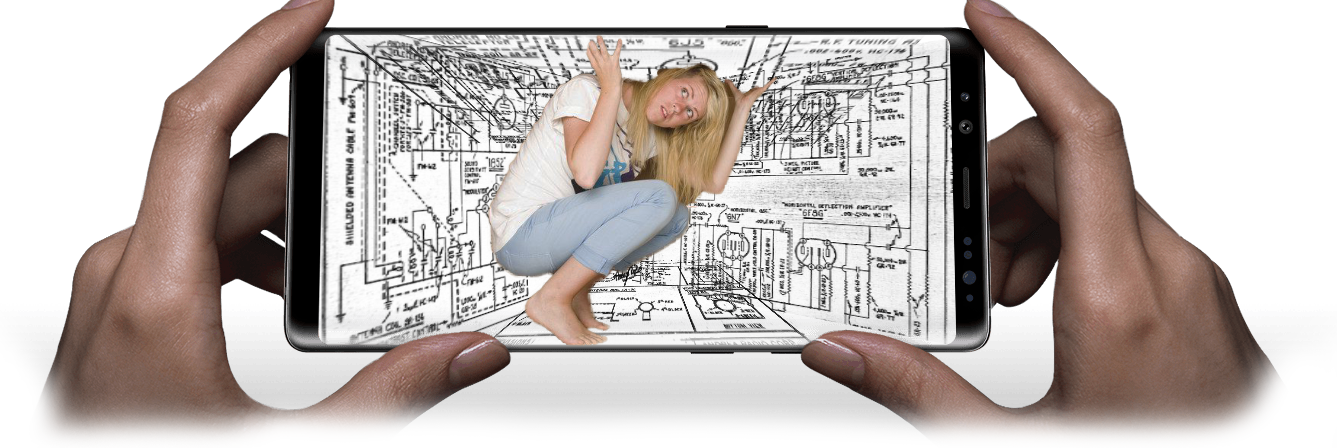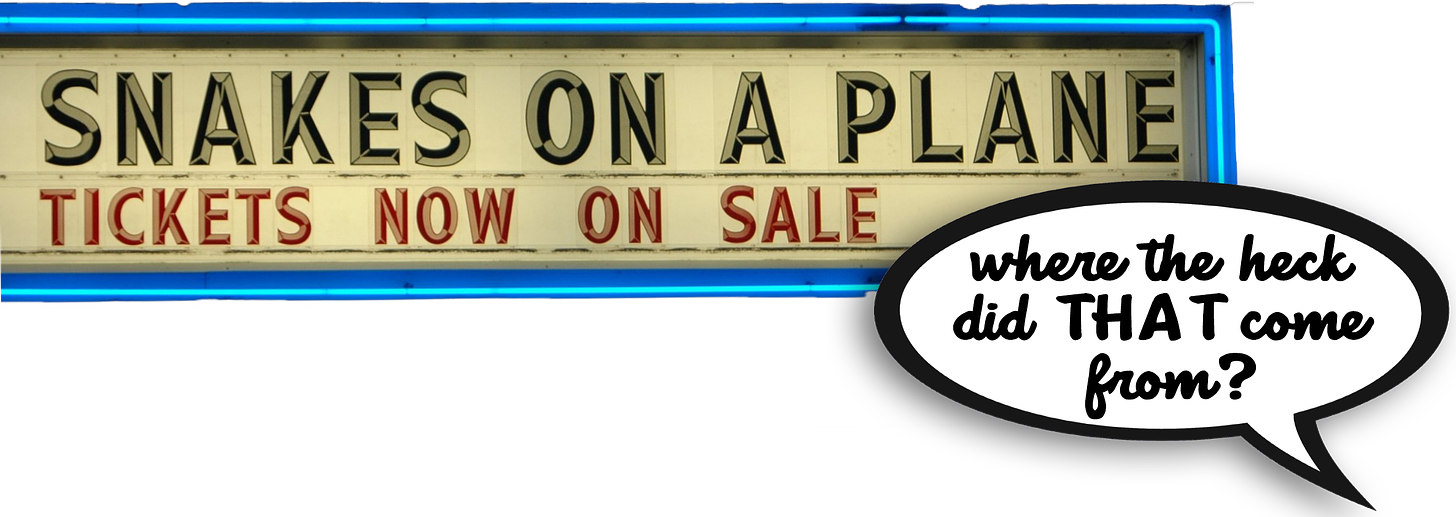There's a “game” I like to play wherein I’ll glance up from whatever article I'm reading on my dedicated reading tablet and take a look around at the real world while trying to gauge how much that thing I'm reading about affects the world I’m looking at.
Rarely, but sometimes, it’s a lot! Especially because I try to follow as many local news sources as possible.
Occasionally, like with say- news from an ongoing war, it affects me indirectly. Worth being educated on, even if I don’t personally feel the effects.
But often, the thing I’m reading about will feel like it exists purely within the device I’m reading it on. As though instead of a news/RSS app, I’m reading a novel with it’s own internal lore. Interesting- but wholly isolated from the broader world as I see it.
You may be surprised to hear that despite penning a newsletter about establishing healthy boundaries with the online world, I still find the web and it’s goings-on totally fascinating. I’m endlessly interested in hearing about weird rabbit holes, or learning about the extremely niche corners of already niche online communities. I also like to keep up on the latest technologies out there, even though I hardly ever buy any of it.
There’s a newsletter I read sometimes on Substack called Garbage Day, which gets very into the weeds of some obscure internet spaces and will often trace the origins of the latest online trends/memes/etc. and translate them for someone not “in the know”. If you’re interested in such things, but not at the cost of immersing yourself in “very online” spaces, it’s a fun way to get a weekly digest of all the meaningless stuff you missed out on by not being on social media1. I’d like to give a nod to Garbage Day’s main author,
, who is almost certainly destroying his sanity so that you and I don’t have to.I know some people would prefer to get off social media and forget about it forever, but I still find the concept too interesting (or horrifying) to look away. I use publications like Garbage Day as a way of staying “updated” on the spaces I’ve left behind, but also off-label as a reminder of how most of what’s being discussed online only really matters to people who are online. And if you’re not online, most of it hardly matters at all.
I bring up Garbage Day because I had a brief moment of panic while reading a recent post about the dominance of TikTok as the latest “main” social media:
“Over the years, there have been lots of platforms that have assumed the role of the “the front page of the internet”. Sites like Reddit, Digg, Facebook, YouTube, Snapchat have all had phases where they felt like they were the main artery of the zeitgeist.”
He ends with this:
“…for people who do not closely follow TikTok — of which there are still many — culture will continue to feel more and more random and confusing.”
“Oh my!” I thought in distress. I’ve never been a TikTok user and I don’t plan to be. But I also don’t want culture to feel random and confusing! I’m only just now getting used to the fact that baggy pants are coming back into fashion, and I already know what pants are. I have no idea what half of these obscure internet memes are referring to. Is everyone who’s not “very online” doomed to end up scared and “without it” like Abe Simpson?
But then dear reader, I played my “game”. I took a breath and looked away from the internet. I realized none of the “culture” I’d be missing out on actually matters if I’m not even on those platforms in the first place, because very little of what originates there ever consequentially bleeds into the world outside of those platforms.
What Ryan Broderick said is this:
…for people who do not closely follow TikTok […] culture will continue to feel more and more random and confusing.
But the specific reality is this:
…for people who do not closely follow TikTok […] internet2 culture will continue to feel more and more random and confusing.
Despite the internet becoming very mainstream, internet culture (as is shaped by the very online trendsetters of social media) still largely exists only on the internet. And in many ways- it has to. The more complicated the formats of memes get, the more difficult it is to enjoy them offline. TikTok’s audio earworms can’t be easily replicated without the accompanying video. And even “old-style” single panel memes become tedious and unfunny when explained out loud in person using words.
The point is- nobody operating in the physical world is ever going to meaningfully “miss out” for not knowing the latest TikTok trends because there’s hardly any way to even communicate knowledge of said trends outside of directly asking: “Hey did you see the latest TikTok thing”? Keeping up with the latest internet-based cultural touchstones won’t (can’t) open any offline doors that wouldn’t also open for not-knowers. When it comes to internet culture, non-participants simply cannot be left behind the way grandpa Simpson was, online cultural elements (for the most part) only exist online.
Social media use has upsides, but they rarely outweigh the downsides. It’s what makes quitting so difficult- we’re not choosing between good and bad, we’re choosing between net-good and net-bad. When we feel FOMO from social media, the thing we’re afraid to miss out on has some sort of tangible benefit outside of the thing itself, even if it’s as simple as “memes are fun”.
But consider that if the thing we’re missing out on has no transferable credit outside of the environment it was created in —if the cultural benefit to knowing the latest TikTok memes only exists within the cultural sphere of social media— can one really be said to be “missing out” for not participating in social media? There’s an old saying that comes to mind about a fish missing out by not owning a bicycle.
A Sensation of Integration
“The Internet” is often depicted as being increasingly “integrated” with large swaths of our daily lives, and there’s an expectation that said integration will only become more ubiquitous in the future as more and more activities take place in digital spaces. But I wonder sometimes- is the idea that we (meaning individuals) are deeply integrated with the internet actually true? Or does it only feel that way because we’re spending so much time looking at limited, but algorithmically-engineered attention-holding spaces? Is it even reasonable to call something “integrated” if it can be withheld entirely with no tangible effect? In fact- can a wholly supplemental activity ever become truly “integrated” into our lives in a way that doesn’t resemble addiction?
Here’s a question: Say for example, that you “like” a friends’ photo on Instagram. Are you integrating that friend into your life in a way that couldn’t have been done more effectively without social media?
I suspect it’s more likely that your "like” is just a stand-in for what would have been something more meaningful, like a call or text, if social media didn’t exist. From this perspective Instagram hasn’t integrated or “streamlined” your friendship at all, it’s actually taken away something deeply important about it.
Personally, the only parts of the internet that I would describe as being truly integrated into my life are the tools I use. Things like maps, messages, translate, etc. ie: The services that simplify my life more than they complicate it. The total time spent using those apps and services is so minimal I hesitate to even describe them as “integrated” though I suppose it technically meets the definition.
Inner space
So many internet spaces get so meta and so wrapped up in their own lore that it's easy to lose the thread of not only why you should care but what it is you're even caring about.
For example; “YouTube drama” is a thing many people get emotionally invested in. It exists on YouTube, obviously, but also is discussed on other “downstream” social media sites. But also consider that the very concept of “YouTube drama” has essentially zero bearing on the offline world. If you tried to explain a beef between two YouTubers to someone who isn’t on social media, it would be frustrating and boring for both parties, like trying to describe the importance of a horcrux to someone who doesn’t live in the Harry Potter universe.
Now on occasion internet culture does pour over into offline reality- the events of January sixth is a prominent example of what happens when the internet-based lore of a specific group of people affects non-participants. An American who had deleted social media might be very confused by what exactly led to the events of that day. But events that both originate on social media and that also affect the daily lives of non-users are actually very rare. I’m struggling to think of another. Perhaps stumbling across an influencer doing something performatively weird in public? Or maybe “Snakes on a Plane” existing?
Next time you’re feeling like the internet is “out there” and full of wondrous things you’re missing out on, look up from your device and try to remember that it’s actually in there. Tiny and self-contained. Social media connects us alright, but it’s to something small. And that small connection comes at the cost of disconnecting us from something big.
I’d eventually like to do a write-up of some other “I’m offline but want to know the highlights from what’s online” resources so let me know if you know of any others.
The pedant in me always gets a little upset when someone says “internet” when what they mean is “social media” but for the sake of brevity just bear with me. I think I just came up with the idea for a new rant.







‘I’d eventually like to do a write-up of some other “I’m offline but want to know the highlights from what’s online” resources’
I can’t think of any offtge top of my head (I’ll get back to you if something springs to mind) but I’d be very interested in reading this write-up.
Great work here as always Justin.